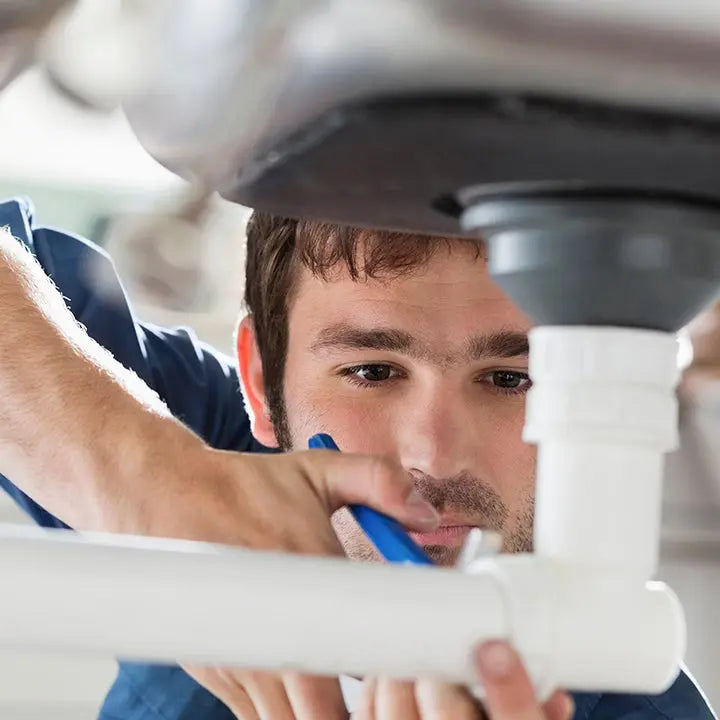
When it comes to your sink-based cabinets, you probably don’t spend a lot of time thinking about them beyond what you can store in them. But, if you’ve recently had a new cabinet installed, you may be wondering what steps to take to protect the cabinet from “under the sink” damage. Let’s take a look at the best tips you can use to prevent your cabinet from accruing mold, rot, and water damage, and which accessories you can utilize to prevent accidents from occurring.
5 Tips to Prevent Under the Sink Damage
Under the sink damage can be caused by a whole host of circumstances, from improper plumbing installation and overhead appliance failure, to the small trickle of unnoticed leaks, to broken seals. While the most common cause of damage is water, if you live in a coastal climate, even excess moisture in the air can be a culprit.- Remove Excess Moisture From Your Home. If you live in a humid area, consider purchasing a dehumidifier to keep out excess moisture. This can help you regulate the rooms in your home that get hit the hardest during those humid months. If you have cats, litter can be a great way to contain moisture in the house as well, so grab a few extra bags of these (the silica in the litter is what absorbs moisture).
- Run Smell Tests on a Regular Basis. In the rooms that have the most cabinets, run regular smell tests and pay attention for any musty or unpleasant mildew odors. When wood gets wet, mold will grow rather quickly and should be detectable by the foul smell that it gives off. If you smell this, immediately begin checking around your sinks, cabinet bottoms, plumbing, and refrigerator for signs of a water leak. By doing this, you can catch a leak early on and prevent the majority of the damage.
- Waterproof Your Cabinets. This is one of the best things you can do to prevent under the sink damage from happening. The only thing you need for this is a high-quality primer and a sealant like polyurethane. This will ensure that if you do have a leak, the water will run off the inside of the cabinets without soaking into the wood. Apply to both the inside and outside of the cabinet. Also look into waterproofing around the sink itself, and the backsplash!
- Use Silicone to Protect Around Your Pipes and Faucets. This is one of the most budget-friendly ways to protect your cabinet from water damage. Silicone can be bought for super cheap, and all you need to do is apply it to the area surrounding your pipes and faucets. This helps keep the area around these fixtures dry, which can help prevent water damage.
- Install Cabinet Door Guards. These are a simple and effective way to prevent under the sink damage to your cabinets, as they create a barrier between the cabinet door and the floor. This can prevent moisture from seeping into the cabinet space, as well as keep water from getting in if you have a flood.
Must-Have Accessories for Preventing Cabinet Damage
Once you’ve followed the above tips, the next step you want to take is to purchase and install an under the sink mat and a leak activated sensor. These two accessories are must-haves when it comes to protecting your cabinet bottom. The mat will keep the cabinet bottom clean, and it will either allow any water to puddle on top of it or absorb the water entirely, preventing it from seeping or sitting on the cabinet bottom. A leak sensor, on the other hand, simply sits underneath the sink and sounds an alarm if it detects water under the cabinet, alerting you to a leak that you can fix ASAP. Most leak activated sensors are low cost, loud, and do not require any batteries or complicated installation systems.Tips on Finding the Right Mat For Under Your Sink?
The easiest way to find the right mat for under your sink is to measure the area you’d like to place the mat, and then purchase a mat in that size. To go about measuring the area, do the following:- Clear the cabinet area of any supplies
- Grab a tape measure and write down the width and depth dimensions
- Make note of where your cabinet hinges are so that your mat does not interfere with them
- Decide on whether you want a plastic or rubber mat.
Be wary of where the pipes are coming through, as you will need to modify the mat to fit where these pipes are, so make sure that when you measure, you measure all the way past the pipes to the back of the cabinet.




Share:
5 Reasons Why You Need A Floor Mat For Your Golf Cart
The Best Way to Waterproof Your Under The Sink Cabinets